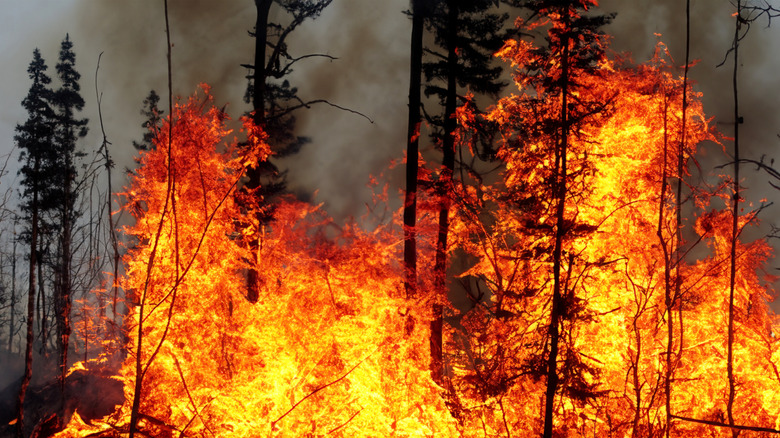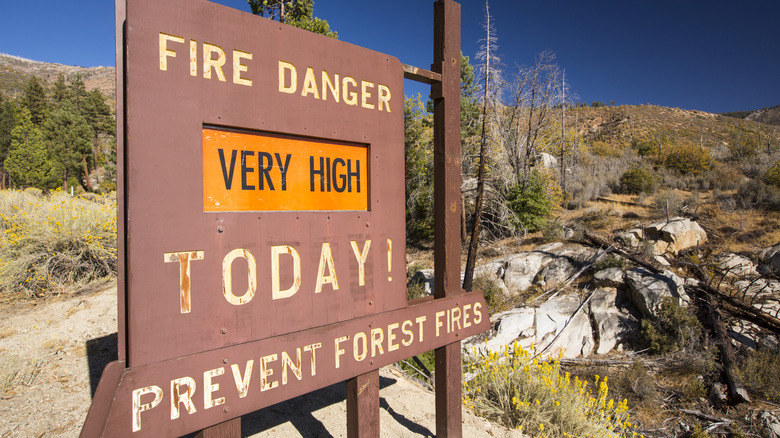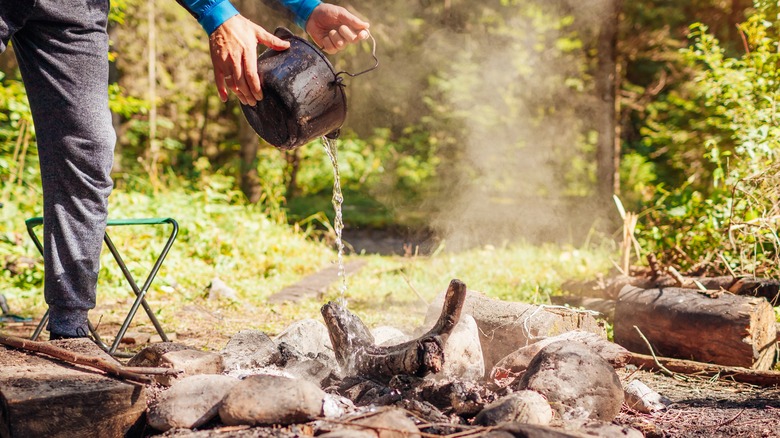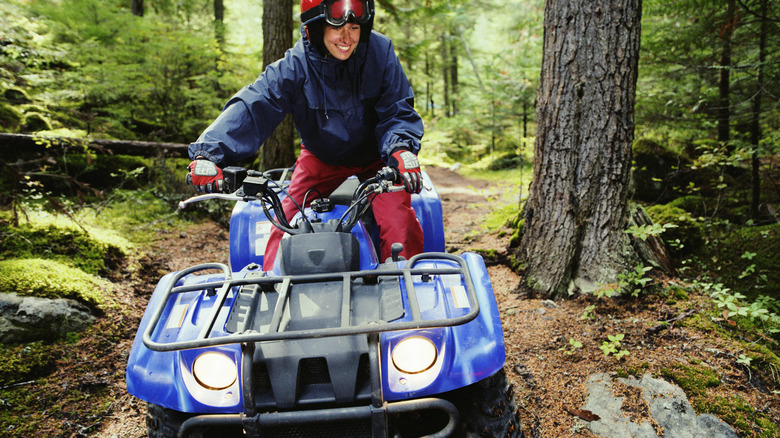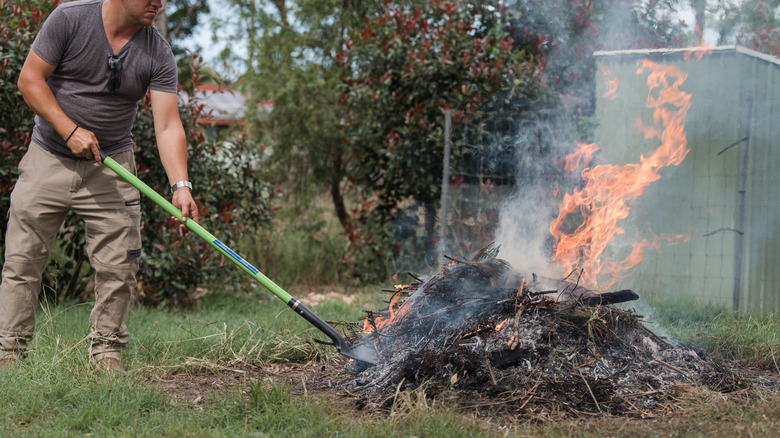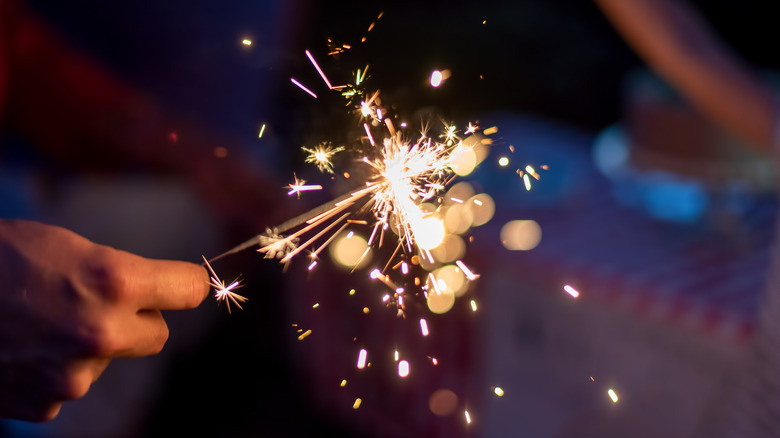How You Can Prevent Wildfires On Your Next Outdoor Adventure
For eight decades, Smokey Bear has been telling Americans only they can prevent wildfires. Given the proliferation of wildfires across the country in recent years, it seems that message may have been lost. In fact, six of the 10 largest wildfires in U.S. history have occurred since 2004, including three in this decade. While several studies suggest periods of extended drought driven from climate change is a major factor in the increase in the number and size of wildfires, Smokey's original advice still holds true –- we can prevent wildfires. While people can't control natural phenomena such as lightning strikes setting a field or forest ablaze, such events cause only a small portion of wildfires each year. According to the National Interagency Fire Center, 87 percent of all wildfires are caused by humans.
Given that the vast majority of wildfires are caused by people, it only stands to reason people can prevent them. While it is important to know what to do if you encounter wildfire smoke, for instance, it is even more important to know how you can prevent wildfires on your next outdoor adventure. By being aware and observant, as well as following a handful of precautions whether in your backyard or a remote campsite, you, too, can prevent wildfires.
Be aware of the conditions before starting a campfire
With the aforementioned climate change causing more frequent drought conditions, the period of time when wildfires are most likely to start, dubbed as wildfire season, has been extended to cover a greater portion of the calendar year. Whether it is within wildfire season or not, periods of time in which conditions are optimal for wildfires to begin can happen. The National Oceanic and Atmospheric Administration issues wildfire watches and warnings when such situations occur. Additionally, the vast majority of campgrounds, state and national parks, and outdoor recreational areas post warnings as well when conditions are ripe for wildfires.
These warnings are not only issued because of drought, but also when weather conditions conspire to create a situation that can fuel wildfires. Hot, dry, windy days can increase the likelihood of a wildfire not only starting, but spreading rapidly. So, while most consider it an essential element of the camping experience, before you attempt to build the perfect campfire, be aware of the conditions and fire risk.
Follow proper campfire safety protocol
Whether for heat, cooking, or ambiance, campfires are a near constant when overnighting outdoors. However, they are also one of the most common causes of wildfires. While it is certainly possible to safely enjoy sitting around a campfire, there are also some common campfire mistakes that can lead to disastrous results. In addition to ensuring there is not a fire warning or burn ban in place before lighting a campfire, there are a few other precautions you should take to avoid inadvertently starting a wildfire.
For starters, choose a safe spot to build your campfire. If the campsite has an existing fire ring or pit, use it. If not, find a location at least 15 feet away from tents, vehicles, trees, or bushes. Make sure there are not low-lying branches overhead. Next, dig a pit about a foot deep and line it with rocks, if possible. Before lighting your fire, make sure you have a way to extinguish it – a water source, shovel and sand, and/or fire extinguisher – nearby. Do not overbuild the fire by placing excessive amounts of wood on it and never leave it unattended. When you are done using the fire, extinguish it thoroughly with water. Then, cover it with sand and dirt. Finally, pour more water over the sand and dirt-covered fire area to ensure it is properly cooled.
Properly maintain and use vehicles and equipment
When thinking about the causes of wildfires, many people don't automatically make a connection to vehicle and equipment maintenance. However, automobiles, ATVs, lawnmowers, chainsaws, and other mechanical devices start several wildfires each year. This can happen in a variety of ways. For one, anything with electrical current running through it has the potential to malfunction and cause a fire. Secondly, vehicles — whether it be automobiles, ATVs, or motorcycles — have numerous parts that become extremely hot, most notably the various parts of the exhaust system. If these come in contact with hot, dry grass, for instance, a fire can be the outcome. Catalytic converters are notorious for starting grass fires. The danger of this happening becomes amplified if the vehicle is not in good working order. The best way to avoid this type of fire is to avoid driving over or parking in tall, dry grass. Stick to the trails and roadways as much as possible.
Sparks are another cause of wildfires. This may happen when something such as a trailer chain drags over rocks or an improperly inflated tire results in the rim striking a rock. Worn brake pads are another common culprit. Sparks can also be sent flying when machinery such as chainsaws or lawn mowers are in use. To prevent sparks, always keep your vehicles and equipment in good working order, make sure nothing is dragging when driving down roads and trails, and always have an extinguishing agent handy when using equipment.
Beware of burning debris in backyard
Whether it be at home or at a cabin or camp house, maintaining a yard area typically means accumulating piles of trimmed branches, fallen leaves, and other natural debris. The way many choose to dispense piles of such materials is by burning them. While this is allowed in most areas — although it is necessary to check if a permit is required — there are also safety precautions that should be taken.
For one, it is recommended to only burn natural material, not household trash and certainly no combustible items such as aerosol cans. Secondly, always pick a safe spot to burn the debris pile. This means it should be away from any structures and clear from any overhead obstacles such as power lines or tree limbs. If possible, try to choose a spot that is sand or gravel. Ideally, the sand, dirt, or gravel base would extend in at least 10 feet around the burn pile. Water down the area around the burn pile before lighting the pile and periodically the entire time it is burning. If you are utilizing a burn barrel, cover it with a metal grate to prevent burning debris from wafting out. Be sure you have an water hose and shovel handy, never leave the fire unattended, and, when done, dose the fire thoroughly with water and over it with dirt.
Exercise caution with other fire sources
Campfires and burn piles aren't the only sources of fire found in campsites and backyards. Discarded cigarettes have long been a cause of wildfires. One of the nation's largest wildfires was actually started by a discarded cigarette in 2017. So, while it seems a cigarette butt will harmlessly smolder out if flung to the ground, chances are it won't. Instead, always have a fireproof container, such as a metal can filled with sand or water, on hand to dispose of used cigarettes.
Fireworks are another common cause of wildfires. It has been estimated over 18,000 fires are started by fireworks and campfires in the United States each year on Fourth of July alone. The frequency of such mishaps is expected to increase as climate change continues to alter weather patterns. To that end, it is actually illegal to possess or use fireworks on federal public lands, which includes national parks. However, the risk still exists in areas where fireworks are perfectly legal. Before attempting to use any fireworks, check to make sure that there are no local ordinances against it. Furthermore, if there is a fire warning, fire watch, or burn ban in place, fireworks absolutely should not be used. If you are planning to use fireworks, have extinguishing agents readily available and supervise the festivities to ensure they are being used safely by all, as some of the more devastating blazes begun by fireworks were set off by minors improperly using the pyrotechnics.
